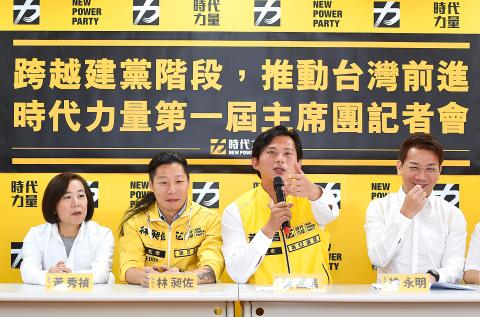The New Power Party (NPP) yesterday announced its new leadership lineup — a seven-member board of chairpersons that it said could prevent abuse of power and encourage participatory democracy — and vowed to win 10 percent of the at-large vote in January’s legislative elections.
The chairpersons are the party’s three legislative candidates — Academia Sinica researcher Huang Kuo-chang (黃國昌), musician Freddy Lim (林昶佐) and author/playwright Neil Peng (馮光遠) — Soochow University political science professor Hsu Yung-ming (徐永明), lawyers Huang Hsiu-chen (黃秀禎) and Lin Feng-jeng (林?正) and author Lin Shih-yu (林世煜).
They were elected last week by 427 party members through an online poll, with Huang Kuo-chang topping the poll with a 76.11 percent support rate.

Photo: Liao Chen-huei, Taipei Times
The new board yesterday held its first meeting, during which Huang Kuo-chang was elected NPP executive chairman.
Hsu said the party’s Decision-making Committee would consist of the seven-member board and eight members from the party’s executive and policy committees, which would prevent authoritarian rule by a single chairperson and encourage direct participation of party members.
Traditionally, when in office, the Chinese Nationalist Party (KMT) and the Democratic Progressive Party have had the president also serve as the party’s chairperson, which allows the president to interfere with the legislature by manipulating party affairs and reduces the legislature’s oversight power, Haung Kuo-chang said.
“I would not become a permanent executive chairperson, as elections for the board of chairpersons is to be held after each major national poll or when one-sixth of the party members demand it.” Huang Kuo-chang said.
“There will be another election after the legislative polls next year,” he said.
The NPP’s executive chairperson is to act as the party’s spokesperson, and would not have the power to control the distribution of resources or party administration, he said, adding different policy committees are to be formed along the lines of the Legislative Yuan’s committees.
He said the party plans to announce the rest of its candidates for district legislative seats as well as a slate of at-large candidates by the end of the month.
Participation by non-member voters would be factored in the selection and ranking of the NPP’s at-large candidates, as candidates have to seek mandate by communicating with local constituents about the NPP’s objectives and the priority bills they would push for if elected, before the party conducts an online poll to gauge the various hopefuls’ support rates, Haung Kuo-chang said.
That would provide voters with the opportunity to directly participate in the NPP’s decisionmaking process, he said.
The NPP has a support rate of about 10 percent in Taipei and New Taipei City, which it expects could translate into votes, he said.

An essay competition jointly organized by a local writing society and a publisher affiliated with the Chinese Communist Party (CCP) might have contravened the Act Governing Relations Between the People of the Taiwan Area and the Mainland Area (臺灣地區與大陸地區人民關係條例), the Mainland Affairs Council (MAC) said on Thursday. “In this case, the partner organization is clearly an agency under the CCP’s Fujian Provincial Committee,” MAC Deputy Minister and spokesperson Liang Wen-chieh (梁文傑) said at a news briefing in Taipei. “It also involves bringing Taiwanese students to China with all-expenses-paid arrangements to attend award ceremonies and camps,” Liang said. Those two “characteristics” are typically sufficient

A magnitude 5.9 earthquake that struck about 33km off the coast of Hualien City was the "main shock" in a series of quakes in the area, with aftershocks expected over the next three days, the Central Weather Administration (CWA) said yesterday. Prior to the magnitude 5.9 quake shaking most of Taiwan at 6:53pm yesterday, six other earthquakes stronger than a magnitude of 4, starting with a magnitude 5.5 quake at 6:09pm, occurred in the area. CWA Seismological Center Director Wu Chien-fu (吳健富) confirmed that the quakes were all part of the same series and that the magnitude 5.5 temblor was

The brilliant blue waters, thick foliage and bucolic atmosphere on this seemingly idyllic archipelago deep in the Pacific Ocean belie the key role it now plays in a titanic geopolitical struggle. Palau is again on the front line as China, and the US and its allies prepare their forces in an intensifying contest for control over the Asia-Pacific region. The democratic nation of just 17,000 people hosts US-controlled airstrips and soon-to-be-completed radar installations that the US military describes as “critical” to monitoring vast swathes of water and airspace. It is also a key piece of the second island chain, a string of

The Central Weather Administration has issued a heat alert for southeastern Taiwan, warning of temperatures as high as 36°C today, while alerting some coastal areas of strong winds later in the day. Kaohsiung’s Neimen District (內門) and Pingtung County’s Neipu Township (內埔) are under an orange heat alert, which warns of temperatures as high as 36°C for three consecutive days, the CWA said, citing southwest winds. The heat would also extend to Tainan’s Nansi (楠西) and Yujing (玉井) districts, as well as Pingtung’s Gaoshu (高樹), Yanpu (鹽埔) and Majia (瑪家) townships, it said, forecasting highs of up to 36°C in those areas